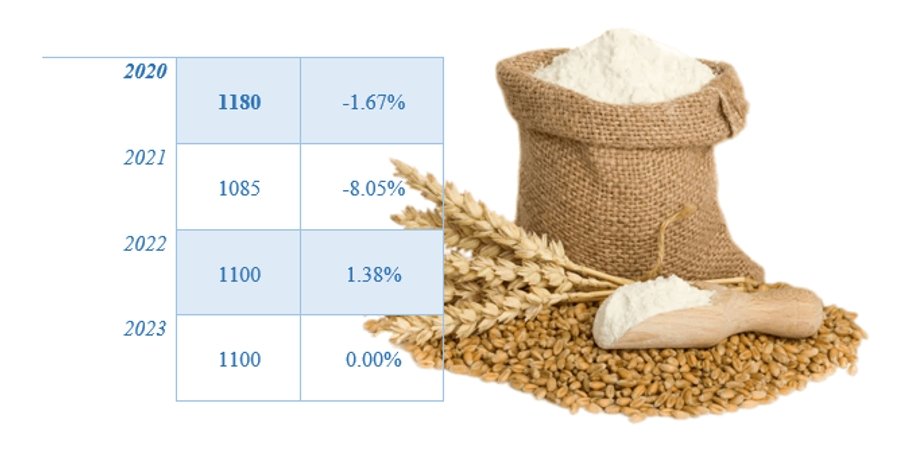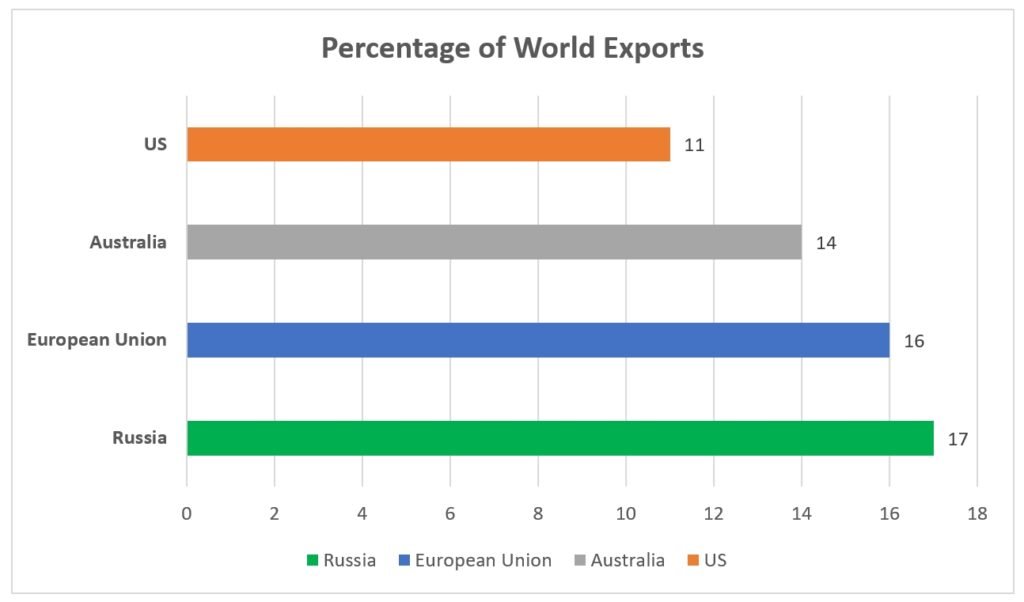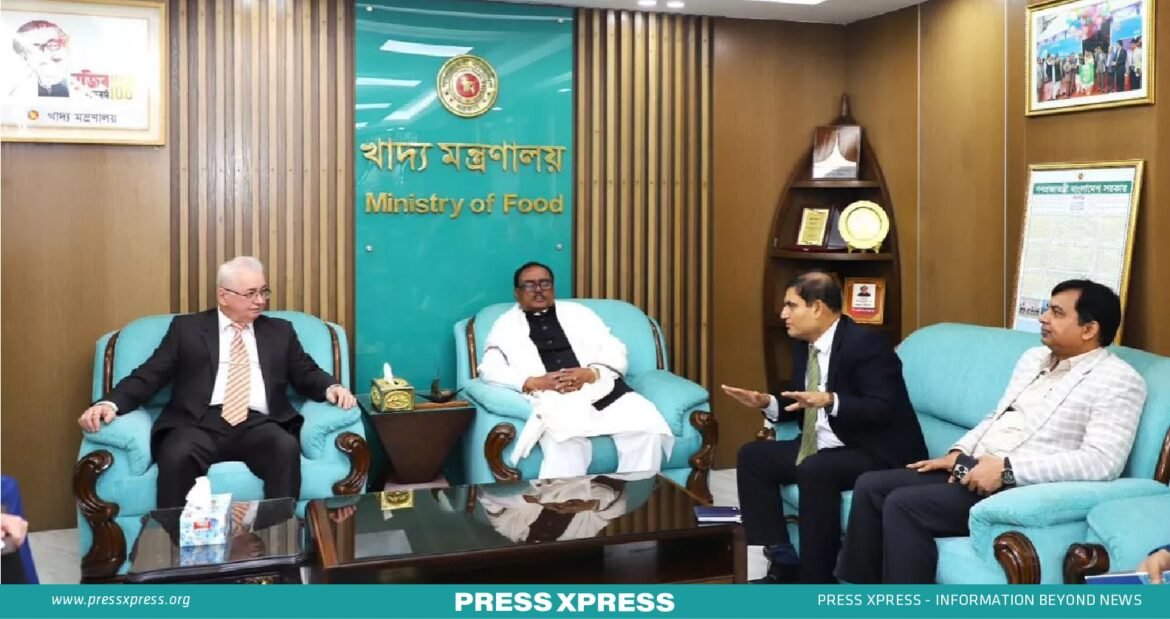In a significant move to strengthen economic ties and foster collaboration between Russia and Bangladesh, the Russian Ambassador to Bangladesh, Alexander Mantytskyi, recently expressed his country’s keen interest in exporting wheat to the South Asian nation. This announcement was made during a courtesy visit to Food Minister Sadhan Chandra Majumder at his office, highlighting the growing importance of bilateral trade relations between the two countries.
The proposed wheat export from Russia to Bangladesh signifies a notable step forward in fortifying the economic and trade connections between the nations. It underlines Russia’s commitment to playing a constructive role in supporting Bangladesh’s ongoing development initiatives, particularly in the crucial area of food security.
During the courtesy call on Food Minister Sadhan Chandra Majumder, Russian Ambassador Alexander Mantytskyi conveyed his country’s enthusiasm for engaging in discussions on expanding bilateral trade relations. The meeting provided an opportunity for both parties to deliberate on various issues, with a primary focus on the potential export of wheat from Russia to Bangladesh.
How much wheat is produced in Bangladesh?

Wheat Production and Import in Bangladesh

Wheat Production in Bangladesh
Wheat is the second staple in Bangladesh with nearly 8.5 million tonnes of annual consumption and the consumption has been increasing by 5.0-6.0% per annum. The USDA report said Russia and Ukraine combined supplied 42 per cent of the total imports in the marketing year 2020-2021.
Bangladesh sources a significant portion of its wheat imports from India, Ukraine, and the United States, ranking as the third-largest wheat importer globally. The leading importers of wheat are the United States, with 265,020 Tonnes, followed by the Netherlands at 78,487, and Bangladesh securing the third position with 62,173 Tonnes.

What are the top 5 countries that export wheat?

Wheat Trade Flourishes
In a testament to the commitment shared between Russia and Bangladesh, the Directorate General (DG) of Food in Bangladesh has inked contracts to import 3 lakh tonnes of wheat from Russia at $313 per tonne for the first half of the fiscal year 2023-24. A senior official from the food office confirmed that Russia has already shipped 1.5 lakh tonnes, with the remaining quantity set to arrive in February.
Noteworthy is the significant role Russia plays as a reliable source of wheat for Bangladesh. Out of the 6.79 lakh tonnes of wheat imported by the DG of Food in the fiscal year 2022-23, a substantial 5 lakh tonnes were sourced from Russia. This underscores the crucial position of Russia as a key contributor to meeting the wheat demand in both the public and private sectors of Bangladesh.
Data from the food ministry reveals that between July 1 and January 17 in the fiscal year 2023-24, the public sector’s wheat import reached 2.61 lakh tonnes, emphasizing the pivotal role of wheat imports in addressing the domestic demand for this staple food item.
The ongoing collaboration in the wheat trade between Russia and Bangladesh is anticipated to have a positive impact on the economies of both nations. As this relationship evolves, the proposed wheat export not only addresses immediate food security concerns but also lays the groundwork for broader economic cooperation and growth.
Russia-Bangladesh Trade Relation: An Overview
As both nations continue to strengthen their bonds, the wheat trade stands as a shining example of collaborative efforts that extend beyond meeting immediate needs, contributing to a framework for sustained economic cooperation.
In March 1972, the founder and the first president of Bangladesh, Sheikh Mujibur Rahman, paid a visit to Moscow. During the trip, intergovernmental agreements were concluded on economic and technical cooperation, in providing free assistance for restoring navigation in the seaports of Bangladesh.
In 1972, responding to Bangladesh’s request, the Soviet Navy’s Special Expedition 12 cleared the Chittagong port of mines and sunken ships after the Liberation War. Despite the passage of fifty years, Bangladesh continues to honor the Soviet sailors. From 1971-1975, the USSR provided economic aid, notably assisting in constructing the Ghorashal TPP. In 1991, Bangladesh recognized the Russian Federation as the USSR’s successor, initiating enhanced cooperation under the Awami League government in 2009. Key meetings in 2010, 2013, and 2016 outlined future cooperation.
The 2017 Intergovernmental Commission streamlined economic ties. Russian military hardware, including aircraft and helicopters, is used by Bangladesh. Over 6,000 Bangladeshis graduated from Soviet and Russian universities, contributing significantly to their country. Bilateral education cooperation, especially for the Rooppur NPP, remains robust. In 2021, Russia provided 70 scholarships to Bangladeshi students.
Bangladesh and Russia share views on inter-faith dialogue and combatting extremism through the Group of Strategic Vision “Russia-Islamic World.” Cultural exchanges foster mutual understanding, though the pandemic hampered activities. Notably, a concert in November 2021 celebrated Bangladesh’s independence and Sheikh Mujibur Rahman’s centenary.
Bangladesh stands as a crucial partner for Russia in South Asia, with strong and promising relations. The potential for cooperation is substantial, and all conditions are in place to fully utilize it.
Economic And Political Significance
The impetus behind this move stems from Russia’s desire to diversify its export market amidst Western sanctions following the Ukraine war. The dialogue on food product purchases began in 2023, with the Russian Embassy in Bangladesh expressing interest in bolstering cooperation through a G2G supply of various food items at competitive prices.
The proposed deal assumes critical importance against the backdrop of soaring food prices in Bangladesh, exacerbated by the Ukraine conflict and dwindling foreign exchange reserves for food imports. The country heavily relies on wheat and edible oil, both significantly impacted by the ongoing crisis.
Conclusion
As the relationship continues to evolve, it is anticipated that such initiatives will not only address immediate food security concerns but also foster a broader framework for economic cooperation and growth. The proposed wheat export serves as a testament to the shared commitment of Russia and Bangladesh to deepen their economic ties for mutual benefit.


